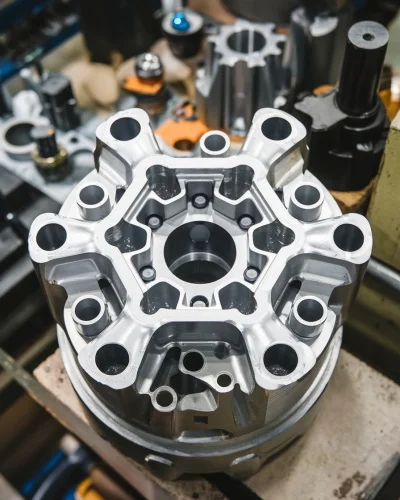Unraveling the World of Zamak: The Multifunctional Zamak Alloy Die Casting
Unraveling the World of Zamak: The Multifunctional Zamak Alloy Die Casting
Blog Article
Alloy die casting is a production technique that necessitates the application of high pressure to molten metals, which are then injected into mold cavities. This method is suitable for molding parts that are complex in shape and require high precision in their dimensions and surface finish. Among other alloys utilized in die casting, zinc alloys, and especially Zamak, are known for their peculiar characteristics and broad usefulness.
What is Zamak?
Zamak refers to a set of zinc alloys having a Zahner group characterization, which makes them suitable for die casting. The term "Zamak" is an abbreviation which is derived from the German words of its major constituents Zink, Aluminium, Magnesium and Kupfer. Zamak alloys are endowed with favorable casting characteristics such as a reasonable melting point coupled with high fluidity and good mechanical properties. This makes Zamak ideal for parts which are sophisticated and require high detail.
The alloys of Zamak are assigned numbers according to their composition, Zamak 12 being the most common variant. Utilization of Zamak 12 specially shines in gravity-fed sand casting due to its strength, durability, and affordability.
Zamak's Applications in Daily Life
Zamak is one of the materials that can be encountered in many facets of life, from industrial goods to Zamak’s economical household items. Because it is cheap and versatile, the ease of manufacturing with Zamak makes it one of the most popular materials. Below are a few common uses of Zamak:
Household Fixtures: Zamak's corrosion resistance and ability to be intricately cast makes it useful in fabricating door handles, towel racks and sink faucets.
Automotive Parts: Zamak’s durability paired with its light weight makes it ideal for use in the automotive industry, where it is employed in the manufacture of many car badges, emblems and other small parts.
Toys and Models: Zamak’s cost effectiveness and ability to provide fine details enables its use in the production of die-cast toy cars and model kits.
Kitchen Appliances: Zamak is mostly used as a shell in coat for more sophisticated appliances like the kitchen aid mixer, it gives them a durable and aesthetically appealing finish.
Benefits of Zamak Relating to Die Casting
Zamak has some benefits that make it advantageous to be used in die casting:
Easy to Cast: Zamak die casts are easier to produce since Zamak has a lower melting point than aluminum. It gives: efficiency, and a low temperature fluid for casting. Optimal Flow: The alloy has a high rate of fluidity which helps in filling the mold cavities and hence assists in creation of detailed and intricate components. Economically Viable: Zamak is less valuable than other metals which assists is its adoption during mass production. Enhanced Mechanical Properties: Suitable for diverse applications, Zamak alloys have a fair combination of strength, toughness and durability.
Zamak parts acquire a high luster and are polished easily, enabling an attractive surface finish.
Other Considerations
There are numerous benefits of Zamak alloys die cast parts; however, the following considerations arise:
Zinc Pest: Also termed zinc rot is a phenomenon where the material deteriorates with time because of small amounts of lead impurities within the Zamak alloys. Use of high purity Zamak alloys can resolve this challenge. Other Issues: When it comes ike most things in life it has a more comforting side and things to consider. Zamak has its own issues, but one is most notable: it’s weight. Unlike aluminum, Zamak is not light at all which may be a dealbreaker for some applications.
Strength of Zamak: Being lightweight is arguably the most notable issue zamak holds. Coupled with the claim that it is not easily portable is only made stronger due to its combination to other stronger materials like iron and steel. This overall contributes to its lack of usage in high-stress activities.

What Makes A Manufacturer of Alloy Die Castings The Preferred Manufacturing Partner?
Selecting the correct alloy die casting manufacturer is critical for achieving precision parts. Some manufacturers lack adequate experience and equipment for meeting required specifications. This is why it is important to explain your needs and expectations to your provided employees. For you to see the gaps between your expectations and reality, consider forecasting sales in advance based on data. Here are some advantages of working with a professional manufacturer:
Expertise: An alloy die casting manufacturer will have the right knowledge and skills to fuss over the proper processes and materials needed for an effective outcome on every piece.
Quality Control: Part performance techniques that are able to attest to their claims are only present in professional manufacturers and never in small shops.
Customization: Professional suppliers take your specifications into consideration while they manufacture the goods for you.
Cost Efficiency: Different suppliers have different prices for equal quality goods and services. You do not need to sacrifice quality, since efficient processes at a given supplier can cut costs on equal product value and service.
In die casting, Zamak is one of the most important alloys due to its economical and multifaceted components. From household appliances to vehicles, Zamak's distinctive features make it useful throughout myriad industries. Regardless of the factors that need to be taken into consideration, Zamak's advantages surpass the limitations which is the reason for its global usage. Reach out to a seasoned alloy die casting manufacturer for Zamak alloy guidance if you aim to achieve precise die-cast part production.